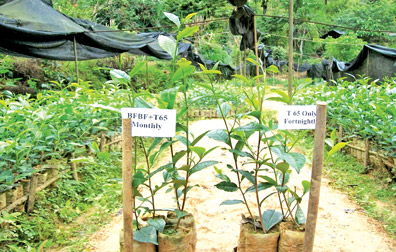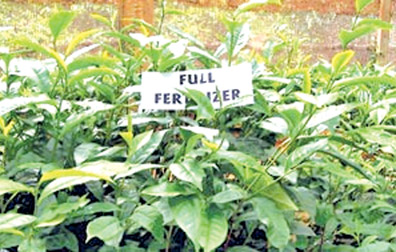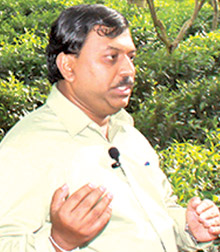Success comes naturally to bio-fertilizer
by Isuri Yasasmin Kaviratne
Amidst a raging debate on the impact of chemical fertilizer on the environment
and the human population, a sizeable market has emerged for a range of
bio-fertilizer pioneered by two Lankan professors.
 |
| |
 |
|
Bio-fertilizer used in a
tea plantation |
 |
|
Prof. Gamini
Seneviratne |
Professors Gamini Seneviratne and S.A. Kulasuriya of National Institute of
Fundamental Studies (NIFS) have patented the bio-fertilizer, a 100% environment
healthy alternative to chemical fertilizer. It has already hit the market and
been well received.
Prof. Seneviratne explained, their search started way back in 2002. Research has
revealed several discoveries that led to the production of the natural
fertilizer, currently a favourite among local and several South Asian tea
cultivators.
The initial research disclosed that fungi and bacteria associated with each
other in the contaminated plates used in the research. Further examination
proved that the surfaces of fungi and bacteria attach to each other in liquid
cultures. “It was discovered, this could be used as fertilizer but we were not
certain as to what kind of effect the bio-fertilizer would have on cultivations;
whether it would be an improvement or not,” Seneviratne explained. However,
continuous experiments led to the revelation that natural fertilizer improves
the quality of cultivations. These findings were first published in 2003.
The two years following the first publication was spent in laboratories,
focusing on further research on accentuating its benefits as bio-fertilizer, at
greenhouse level and on rice cultivations. The Tea Research Institute of Sri
Lanka collaborated with the NIFS in 2005, looking into how this breakthrough in
fertilizer could be used in a beneficial way for tea cultivation in Sri Lanka.
The next breakthrough was recorded after eight years of research. Seneviratne
explained how they discovered that bio-fertilizer could be used for mature and
developing tea trees, and reduce the use of chemical fertilizer which includes
nitrogen, potassium and phosphorus by 50%. The research to look into its
suitability on paddy and vegetables has started to show progressive results,
Seneviratne said.
They have collaborated with the Peradeniya Botanical Gardens to experiment on
the use of fertilizer on flowers.
The initial research is based on anthuriums and orchids. The research on coconut
cultivation would take longer to show results, Seneviratne said, as they are
long term cultivations.
The mass production of fertilizer began in 2014, by Lanka Bio Fertilizer (Pvt)
Ltd, and further information can be accessed at www.biofilm.lk.
There are several varieties of bio fertilizer available on the market, BIOFILM-T
for tea cultivations, BIOFILM-VEG for vegetables, BIOFILM-R for rice. “There is
a demand from individuals for the fertilizer, while the bigger companies are
entering into contracts,” Seneviratne said.
In 2009, the Indian Agriculture Research Institute started on the same research
and is continuing it, using the same terms as used by the research team at NIFS.
Meanwhile, Prof. Seneviratne said that Indian Tea Research Institute had
approached them with a proposal to use the bio-fertilizer in India, where the
latest available bio-fertilizer reduced the use of chemical fertilizer by 25%.
The first shipment was sent to India in April 2016. “Delegates from the USA too
have approached us and discussions are under way,” he said. |

